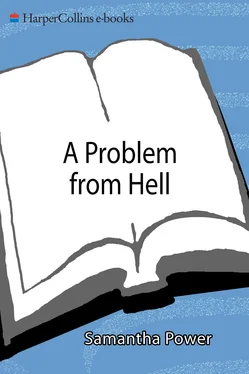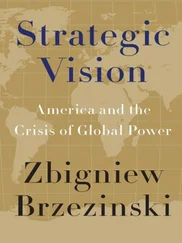Since Nuremberg was making this inroad into state sovereignty, one might have expected Lemkin to cheer from the sidelines. In fact, he was a fierce critic of the court. Nuremberg was prosecuting “crimes against humanity,” but the Allies were not punishing slaughter whenever and wherever it occurred, as Lemkin would have wished. The court treated aggressive war ( “crimes against peace” ), or the violation of another state’s sovereignty, as the cardinal sin and prosecuted only those crimes against humanity and war crimes committed after Hitler crossed an internationally recognized border. 6Nazi defendants were thus tried for atrocities they committed during but not before World War II. By inference, if the Nazis had exterminated the entire German Jewish population but never invaded Poland, they would not have been liable at Nuremberg. States and individuals who did not cross an international frontier were still free under international law to commit genocide. Thus, although the court did a fine job building a case against Hitler and his associates, Lemkin felt it would do little to deter future Hitlers.
In May 1946 Lemkin turned up in the rubble of Nuremberg as a kind of semiofficial adviser (or lobbyist) so that he could proselytize in person. He knew the charter’s terms were fixed, but he hoped to get “genocide” incorporated into the prosecutors’ parlance and spotlighted on the Nuremberg stage. Even if genocide were not punished, at least the court could help popularize the new term. Lemkin had been teaching part time at Yale Law School. He convinced the dean, Wesley Sturges, to grant him leave on the grounds that it was better to develop international law than to teach it.
Lemkin had spent most of his time since the war’s end tracking down his missing family members. In Nuremberg he met up with his older brother, Elias; Elias’s wife; and their two sons. They told him that they were the family’s sole survivors. At least forty-nine others, including his parents, aunts, uncles, and cousins, had perished in the Warsaw ghetto, in concentration camps, or on Nazi death marches. 7In the words of one lawyer who remembers Lemkin roaming around the corridors at the Nuremberg Palace of Justice, he was “obviously a man in pain.”
If Lemkin was relentless before, the loss of his parents pressed him into overdrive. He spent his days buttonholing lawyers in the halls of the Palace of Justice. Some were sympathetic to his graphic war stories. Others were irritated. Benjamin Ferencz was a young lawyer on Nuremberg prosecutor Telford Taylor’s staff, which was building a case against the Einsatzgruppen , the mobile killing units that butchered Jews in Eastern Europe. He remembers Lemkin as a disheveled, disoriented refugee less concerned with hanging the Nazi war criminals than with getting genocide included in the tribunal’s list of punishable crimes. Most of the prosecutors tried to avoid him, seeing him as a nag or, in Yiddish, a nudnik. “We were all extremely busy. This new idea of his was not something we had time to think about,” Ferencz recalls. “We wanted him to just leave us alone so we could convict these guys of mass murder.”
Lemkin did score an occasional victory. Because of his prior lobbying efforts, the third count of the October 1945 Nuremberg indictment had stated that all twenty-four defendants “conducted deliberate and systematic genocide, viz., the extermination of racial and national groups, against the civilian populations of certain occupied territories.” This was the first official mention of genocide in an international legal setting. On June 26, 1946, British prosecutor David Maxwell Fyfe cheered Lemkin by telling Nazi suspect Constantin von Neurath, “Now, defendant, you know that in the indictment in this trial we are charging you and your fellow defendants, among other things, with genocide.” 8Lemkin wrote Fyfe that summer to thank him “for your great and so effective support which you lent to the concept of Genocide.” He also urged Fyfe to get “genocide” included in the Nuremberg judgment. 9
In late 1946 a weary Lemkin flew from Germany to a pair of peace conferences in England and France. His proposal was again rejected, here on the grounds that he was “trying to push international law into a field where it did not belong.” “Afterward he was admitted to an American military hospital in Paris with high blood pressure. 10No sooner did he land in the hospital ward than he caught two stories on the radio that convinced him he had to return to the United States immediately. First, on what he would later call the “the blackest day” of his life, he heard the pronouncement of the Nuremberg tribunal. Nineteen Nazi defendants were convicted of crimes against peace, war crimes, and crimes against humanity. No mention was made of genocide. But Lemkin heard a second item: The new UN General Assembly had begun deliberating the contents of its autumn agenda. Lemkin checked himself out of the hospital and flew to New York. On the plane he drafted a sample General Assembly resolution condemning genocide.
Closing the Loophole: Moving from Word to Declaration
Lemkin’s aim in New York was to establish an international law that did not link the destruction of groups to cross-border aggression, which accompanied genocide in the Nazi case but often would not. Nuremberg, he noted, had made “an advance of 10 or 20 percent” toward outlawing genocide. 12It had left far too many loopholes through which killers could squirm. Statesmen were interested in preventing war, but they had less interest in genocide. “Genocide is not war!” he wrote, “It is more dangerous than war!” 13War, of course, has killed more individuals in history than has genocide, and it too leaves its survivors permanently scarred. But Lemkin argued that when a group was targeted with genocide—and was effectively destroyed physically or culturally—the loss was permanent. Even those individuals who survived genocide would be forever shorn of an invaluable part of their identity.
On October 31, 1946, Lemkin arrived at the newly improvised UN headquarters, located in an abandoned Sperry Gyroscope war plant on Long Island. 14The entrenched and somewhat impenetrable UN of today was then unimaginable. Security guards were willing to look the other way when the unaccredited, somewhat fanatical lawyer would turn any empty UN office into his home for the day—“like a hermit crab,” a Hungarian friend said. 15Lemkin spent endless hours haunting the drafty halls.
Kathleen Teltsch and A. M. Rosenthal were then cub reporters with the New York Times . Both were fond of Lemkin but recall the horror of many a correspondent and diplomat when the wildeyed professor with steelrimmed glasses and a relentless appetite for rejection began sprinting after them in the corridors, saying, “You and I, we must change the world.” Teltsch remembers:
He was always there like a shadow, a presence, floating through the halls and constantly pulling scraps of paper out of his pockets. He was not loved because he was known as a time consumer. If he managed to nab you, you were trapped. Correspondents on deadline used to run from him like mad. But he would run after them, tie flopping in the air, genocide story at the ready.
Rosenthal occupied the desk nearest the door of the New York Times office, where Lemkin popped his head in several times a day offering a new angle on the genocide story. “I don’t remember how I met him,” Rosenthal says, “but I remember I was always meeting him.” Carrying his black briefcase, he would say, “Here is that pest, that Lemkin…I have a genocide story for you.” 16
Most of the correspondents who bothered to notice Lemkin wondered how he made ends meet. He was learned enough to maintain a quiet dignity about him, but his collar and cuffs were frayed at the edges, his black shoes scuffed. The journalists frequently spotted him in the UN cafeteria cornering delegates, but they never saw him eat. In his rush to persuade delegates to support him, he frequently fainted from hunger. Completely alone in the world and perennially sleepless, he often wandered the streets at night. 17A New York Post reporter described him as growing “paler, thinner and shabbier” as the months passed. He seemed determined to stay in perpetual motion.
Читать дальше












